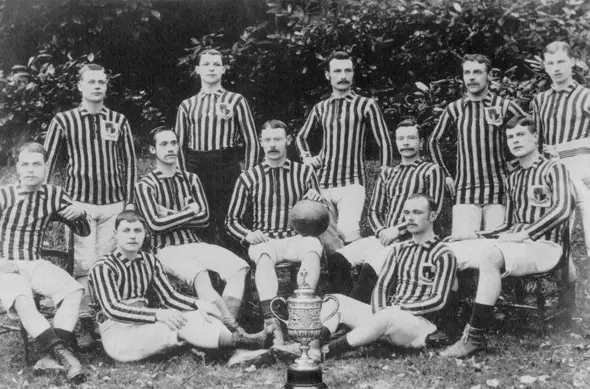The Victorian Era, running from the mid-19th to the early 20th century in Britain, is considered a period of profound social and cultural change. During this time, the British Empire reached its heyday and society went through significant transformations.
The role and influence of sports were important components of this era. Like magicwin, sporting events became not only entertainment but also a means of social interaction and identity expression. And the focus was on football, which was under active development and establishment as a popular sport.
History of football in the Victorian Era
The early forms of football in Britain can be traced back well before the Victorian era. However, it was during this time that football gained an organised structure and began to develop into a truly official sport.
In 1863, the Royal Football Association was founded and introduced the first official rules of the game. This was an important step in the development of football, as standardised rules unified the game and created a basis for organising competitions.
It was also at this time that the first football clubs appeared. One of the most famous examples is the Sheffield club, founded in 1857. It was the first organised football club in history and it had a major impact on the development of the sport in the UK and beyond.
In other words, football in the Victorian Era was undergoing the formation and shaping of its identity as a popular sport, and the establishment of rules and the emergence of football clubs were important stages in this process.
Football was extremely popular with the public during the Victorian Era. It became an accessible and entertaining sport that attracted people of all ages and social classes. Matches and tournaments were organised as both private and public events, offering people the opportunity to relax, enjoy the spectacle and actively participate in the game.
Football played a significant role in the formation of social belonging and identity in the Victorian Era. It became a means of uniting people of different classes and professions around a common passion for the game. Different social groups converged on football pitches, which helped to bring people together and strengthen ties in society.
Football also had an impact on class structure and social mobility. It provided a chance for talented athletes from lower social classes to prove themselves and excel in sport. Through football, some players were able to overcome social barriers and reach new heights, attracting the attention and respect of society.
Thus, football in the Victorian Era became not only a popular form of entertainment and recreation, but also a strong factor of social change, promoting social integration and increasing social mobility.
Sports clubs and their importance
With the development of football in the Victorian Era, sports clubs emerged and developed and played an important role in social life. These clubs not only provided a venue for competition and training, but also became centres of social activity and group identity. Participation in clubs gave people the opportunity to unite around a shared passion for football, to develop skills and abilities in the game, and to make new connections and acquaintances.
Some clubs that emerged in the Victorian Era still exist today, keeping their history and traditions alive. An example of such a club is Nottingham Forest, founded in 1865, which continues to play and compete at a high level today. This is a testament to how football clubs have become an integral part of cultural heritage and communities over the centuries.
Influence on modern football
This era has had a unique impact on modern football. Many aspects of the time, such as the organisation of competitions, the creation of rules and the formation of clubs, continue to be present and influence modern aspects of the game.
Modern football reflects some aspects of the Victorian Era, for example in the use of football pitches, team formation and competition. The concept of competition and the conditions of play established during the Victorian Era remain important in the modern rules of football.
Conclusion
The Victorian Era is hugely important in the history of football and influences the modern day. Studying and understanding the history of football during this time period helps us to realise how football became so popular and why it has such a significant place in society. Sport, and football in particular, continues to be an important aspect of our culture and community, and the history of these games helps us to enjoy and appreciate it even more.




